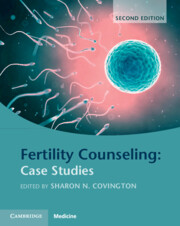Book contents
- Fertility Counseling: Case Studies
- Fertility Counseling: Case Studies
- Copyright page
- Dedication
- Contents
- Preface
- Contributors
- Part I Introduction
- Part II Therapeutic Approaches
- Part III Third Party Reproduction: Assessment and Preparation
- Part IV Addressing the Needs of Diverse Populations
- Part V Special Topics in Fertility Counseling
- Part VI Practice Issues
- Chapter 25 Telemental Health in Fertility Counseling
- Chapter 26 Nuts and Bolts of Fertility Counseling: Legal Issues and Practice Management
- Chapter 27 Ethical Platform of Assisted Reproduction
- Index
- References
Chapter 27 - Ethical Platform of Assisted Reproduction
from Part VI - Practice Issues
Published online by Cambridge University Press: 24 November 2022
- Fertility Counseling: Case Studies
- Fertility Counseling: Case Studies
- Copyright page
- Dedication
- Contents
- Preface
- Contributors
- Part I Introduction
- Part II Therapeutic Approaches
- Part III Third Party Reproduction: Assessment and Preparation
- Part IV Addressing the Needs of Diverse Populations
- Part V Special Topics in Fertility Counseling
- Part VI Practice Issues
- Chapter 25 Telemental Health in Fertility Counseling
- Chapter 26 Nuts and Bolts of Fertility Counseling: Legal Issues and Practice Management
- Chapter 27 Ethical Platform of Assisted Reproduction
- Index
- References
Summary
I am a board-certified reproductive endocrinology and infertility specialist with a focused interest in reproductive genetics. The most challenging aspect of being an infertility specialist lies in the complexity of clinical decision-making and the ability to compassionately convey the disappointments that our innate biology brings us.
- Type
- Chapter
- Information
- Fertility Counseling: Case Studies , pp. 149 - 155Publisher: Cambridge University PressPrint publication year: 2022



